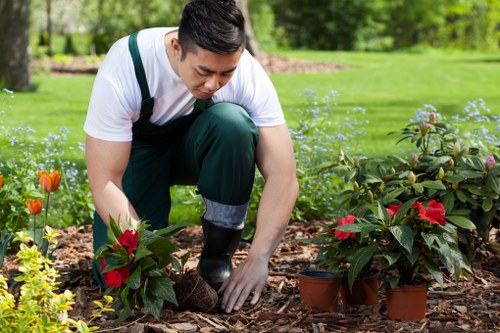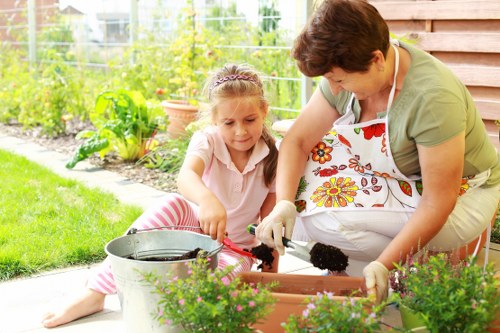Comprehensive Guide to Garden Maintenance in Uxbridge

Maintaining a beautiful garden requires dedication, knowledge, and the right tools. In Uxbridge, where the climate and soil conditions are unique, effective garden maintenance is essential for thriving plants and vibrant landscapes.
Whether you're a seasoned gardener or a beginner, understanding the best practices for garden maintenance can help you achieve a picturesque outdoor space. This guide covers everything from seasonal care to pest management, ensuring your Uxbridge garden remains lush and healthy all year round.
Let's explore the key aspects of garden maintenance tailored specifically for the Uxbridge area.
Understanding Uxbridge’s Climate and Soil

Uxbridge experiences a temperate climate with distinct seasons, which significantly impacts garden maintenance strategies. Understanding the local climate is crucial for selecting the right plants and scheduling maintenance tasks effectively.
The region typically enjoys warm summers and cold winters, with moderate rainfall distributed throughout the year. These conditions favor a wide variety of plants, but they also require gardeners to be proactive in protecting their gardens from extreme weather.
The soil in Uxbridge varies, but it is generally fertile and well-draining. Conducting a soil test can help determine the pH levels and nutrient content, allowing for better-informed decisions regarding soil amendments and plant selection.
Seasonal Garden Maintenance Tasks

Each season in Uxbridge presents unique challenges and opportunities for garden maintenance. Adapting your care routine to the changing seasons ensures your garden remains healthy and vibrant.
Spring Maintenance
Spring is a time of renewal, perfect for preparing your garden after the winter months. Key tasks include:
- Cleaning and pruning plants to remove winter damage.
- Preparing soil by adding compost and fertilizers.
- Planting new flowers, vegetables, and shrubs.
- Setting up mulch to retain soil moisture and suppress weeds.
Summer Maintenance
Summer care focuses on keeping plants healthy during the warmer months. Important tasks are:
- Regular watering, especially during dry spells.
- Weeding frequently to prevent competition for nutrients.
- Monitoring for pests and diseases, taking action as needed.
- Pruning to promote airflow and reduce plant stress.
Autumn Maintenance
Autumn is crucial for preparing your garden for the winter. Essential tasks include:
- Removing spent plants and debris to prevent pests.
- Planting bulbs for spring blooms.
- Applying mulch to protect roots from freezing temperatures.
- Pruning deciduous trees and shrubs.
Winter Maintenance
Winter requires minimal but important maintenance to safeguard your garden. Key activities are:
- Protecting sensitive plants with covers or frost cloths.
- Preventing snow damage by gently breaking up heavy snowfalls.
- Planning for the next gardening season.
- Maintaining tools and equipment to ensure they are ready for spring.
Essential Tools for Garden Maintenance

Having the right tools is fundamental to effective garden maintenance. They not only make tasks easier but also ensure precision and efficiency.
Here are some essential tools every Uxbridge gardener should have:
- Pruning Shears: For trimming and shaping plants.
- Garden Fork: Ideal for turning and aerating soil.
- Hand Trowel: Useful for planting and transplanting.
- Watering Can or Hose: Ensures plants receive adequate moisture.
- Wheelbarrow: Helps in transporting soil, plants, and debris.
- Gloves: Protect your hands from thorns and dirt.
- Rake: Essential for clearing leaves and leveling soil.
Advanced Gardening Equipment
For those looking to take their garden maintenance to the next level, consider investing in advanced equipment:
- Lawn Mower: Keeps your lawn neat and healthy.
- Garden Tillers: Efficiently prepare large areas of soil.
- Sprayers: Apply fertilizers and pesticides evenly.
- Electric or Battery-Powered Tools: Reduce physical strain and increase efficiency.
Plant Selection and Care

Choosing the right plants is critical for a successful garden in Uxbridge. Selecting species that are well-suited to the local climate and soil conditions reduces maintenance efforts and increases the likelihood of thriving plants.
Consider incorporating a mix of native plants, perennials, and annuals to ensure year-round interest and resilience against pests and diseases.
Native Plants
Native plants are adapted to the local environment, making them easier to maintain. They typically require less water and are more resistant to local pests.
- English Lavender – A fragrant perennial that attracts pollinators.
- Holly Hedge – Provides year-round greenery and wildlife habitat.
- Foxglove – Adds vertical interest with tall flower spikes.
Perennials vs. Annuals
Understanding the difference between perennials and annuals helps in planning your garden's layout and maintenance schedule.
- Perennials: Return year after year, requiring less replanting and offering long-term structure to your garden.
- Annuals: Complete their life cycle in one season, providing vibrant colors and filling gaps in the garden.
Vegetable Gardening
For those interested in growing their own vegetables, selecting the right varieties and providing proper care is essential:
- Tomatoes: Thrive in well-drained soil with ample sunlight.
- Carrots: Prefer loose, sandy soil to prevent deformities.
- Spinach: Grows best in cooler temperatures, making it ideal for spring and autumn planting.
Pest and Disease Management
Effective pest and disease management is vital for maintaining a healthy garden. By implementing preventative measures and timely interventions, you can protect your plants from common threats.
Identifying Common Pests
Common garden pests in Uxbridge include:
- Aphids: Small insects that suck sap from plants, causing wilting and deformities.
- Slope Mites: Tiny predators that can damage leaves and stems.
- Slugs and Snails: Tend to feed on young plants and seedlings.
Natural Pest Control Methods
Emphasizing natural pest control methods helps maintain ecological balance:
- Encourage Beneficial Insects: Attract predators like ladybugs and lacewings to naturally reduce pest populations.
- Use Organic Sprays: Neem oil and insecticidal soaps can effectively manage pests without harming beneficial insects.
- Barriers and Traps: Physical barriers like copper tape can deter slugs, while traps can capture and reduce pest numbers.
Disease Prevention and Treatment
Preventing plant diseases involves good gardening practices:
- Proper Spacing: Ensures adequate airflow, reducing the risk of fungal infections.
- Sanitation: Remove and dispose of diseased plant material promptly.
- Resistant Varieties: Choose plant varieties that are resistant to common diseases in the area.
Watering and Irrigation Strategies
Proper watering is a cornerstone of effective garden maintenance. In Uxbridge, balancing natural rainfall with supplemental watering ensures plants receive the moisture they need without overwatering.
Understanding Water Needs
Different plants have varying water requirements. Understanding these needs helps in scheduling irrigation effectively:
- High-Water Plants: Vegetables, hydrangeas, and ferns require consistent moisture.
- Low-Water Plants: Succulents and certain perennials are more drought-tolerant.
- Seasonal Variations: Adjust watering schedules based on seasonal rainfall and temperature changes.
Efficient Irrigation Systems
Installing efficient irrigation systems can save time and resources:
- Drip Irrigation: Delivers water directly to the plant roots, minimizing evaporation and runoff.
- Sprinkler Systems: Suitable for lawns and larger garden areas, though they may be less water-efficient.
- Rain Barrels: Collect rainwater for use during dry periods, promoting sustainable gardening practices.
Water Conservation Tips
Implementing water conservation techniques helps maintain a healthy garden while being environmentally responsible:
- Mulching: Reduces soil evaporation and keeps roots cool.
- Morning Watering: Watering in the early morning reduces evaporation and fungal growth.
- Soil Improvement: Adding organic matter enhances the soil's water-holding capacity.
Lawn Care and Maintenance
A well-maintained lawn enhances the overall aesthetics of your garden. Proper lawn care involves regular mowing, fertilizing, and addressing common issues.
Mowing Techniques
Effective mowing promotes a healthy and lush lawn:
- Proper Height: Maintain the recommended grass height to encourage deep root growth and shade out weeds.
- Mowing Frequency: Regular mowing prevents excessive growth and maintains a tidy appearance.
- Sharp Blades: Ensure mower blades are sharp to make clean cuts and reduce stress on the grass.
Fertilization Practices
Fertilizing provides essential nutrients for grass health:
- Choosing the Right Fertilizer: Select a fertilizer tailored to your grass type and soil conditions.
- Application Timing: Apply fertilizers during the growing season for optimal absorption.
- Proper Dosage: Follow recommended guidelines to avoid over-fertilization, which can harm the lawn.
Dealing with Common Lawn Problems
Addressing common lawn issues promptly ensures a vibrant and resilient turf:
- Weed Control: Regularly remove weeds and consider applying herbicides if necessary.
- Pest Management: Monitor for pests like grubs and treat infestations early.
- Disease Prevention: Maintain proper mowing and watering practices to reduce the risk of diseases.
Pruning and Trimming Techniques
Pruning and trimming are essential for maintaining plant health and aesthetics. Proper techniques encourage growth, remove dead or diseased parts, and shape plants for visual appeal.
When to Prune
Timing is crucial for effective pruning:
- Spring-Flowering Plants: Prune immediately after flowering to avoid cutting off next year's blooms.
- Summer-Flowering Plants: Prune in late winter or early spring before new growth begins.
- Evergreen Shrubs: Light pruning can be done throughout the year, with major pruning best in late winter.
Pruning Techniques
Adopt proper techniques to ensure plant health:
- Use Sharp Tools: Clean, sharp tools make precise cuts and minimize damage to plants.
- Cut at the Right Angle: Make cuts at a 45-degree angle to prevent water accumulation and disease.
- Remove Dead or Diseased Wood: Focus on eliminating parts that show signs of damage to encourage healthy growth.
Tools for Pruning and Trimming
Having the right tools ensures effective pruning:
- Pruning Shears: Suitable for small branches and detailed work.
- Loppers: Ideal for medium-sized branches that are too thick for shears.
- Pruning Saws: Necessary for larger branches and tough wood.
Mulching and Soil Management
Mulching and proper soil management are vital for plant health and garden aesthetics. They help retain moisture, suppress weeds, and improve soil quality.
Benefits of Mulching
Mulching offers several advantages:
- Moisture Retention: Keeps soil consistently moist, reducing the need for frequent watering.
- Weed Suppression: Prevents weed seeds from germinating, decreasing competition for nutrients.
- Temperature Regulation: Insulates roots against extreme temperatures.
- Soil Improvement: Organic mulches break down over time, enriching the soil with organic matter.
Types of Mulch
Choose the right type of mulch based on your garden needs:
- Organic Mulch: Includes materials like bark, straw, and compost, which improve soil fertility as they decompose.
- Inorganic Mulch: Comprises gravel, rubber, and plastic, primarily used for weed suppression and moisture retention.
Soil Amendment Practices
Enhancing soil quality ensures robust plant growth:
- Adding Compost: Enriches the soil with nutrients and improves its structure.
- Using Fertilizers: Provides essential nutrients that may be lacking in the soil.
- pH Adjustment: Modify soil pH based on plant requirements, using lime to raise pH or sulfur to lower it.
Organic Gardening Practices
Adopting organic gardening practices promotes a healthy ecosystem and reduces the reliance on chemical inputs. Organic methods focus on sustainability and environmental responsibility.
Composting
Composting transforms kitchen and garden waste into rich soil amendments:
- Benefits: Improves soil structure, enhances nutrient content, and reduces waste.
- How to Compost: Create a compost pile with a balanced mix of green (nitrogen-rich) and brown (carbon-rich) materials.
- Maintenance: Regularly turn the compost to aerate it and speed up decomposition.
Natural Fertilizers
Using natural fertilizers supports plant growth without harmful chemicals:
- Animal Manure: Provides a nutrient-rich source of nitrogen, phosphorus, and potassium.
- Bone Meal: A slow-release fertilizer high in phosphorus, excellent for root development.
- Fish Emulsion: A liquid fertilizer rich in nitrogen, ideal for leafy growth.
Integrated Pest Management (IPM)
IPM combines multiple strategies to manage pests sustainably:
- Monitoring: Regularly inspect plants for signs of pests and diseases.
- Biological Controls: Introduce natural predators to keep pest populations in check.
- Cultural Practices: Rotate crops and diversify plantings to reduce pest attraction.
Professional Garden Maintenance Services in Uxbridge
While DIY gardening can be fulfilling, professional garden maintenance services offer expertise and save time. In Uxbridge, numerous service providers specialize in comprehensive garden care.
Choosing the Right Service Provider
When selecting a professional garden maintenance service, consider the following factors:
- Experience and Expertise: Ensure the provider has a proven track record in garden maintenance.
- Range of Services: Look for comprehensive services, including pruning, lawn care, pest management, and seasonal maintenance.
- Customer Reviews: Check testimonials and reviews to gauge customer satisfaction.
- Pricing and Contracts: Compare pricing structures and contractual terms to find a service that fits your budget and needs.
Benefits of Hiring Professionals
Engaging professional services offers several advantages:
- Expert Knowledge: Professionals bring specialized knowledge in plant care, soil management, and pest control.
- Time Efficiency: Saves you time, allowing you to enjoy your garden without the hassle of maintenance.
- Enhanced Garden Health: Regular professional care ensures your garden remains healthy and aesthetically pleasing.
Customized Maintenance Plans
Many garden maintenance services offer tailored plans to meet specific needs:
- Regular Visits: Scheduled maintenance visits to keep your garden in optimal condition.
- Seasonal Packages: Services tailored to the requirements of each season.
- Specialized Services: Options for unique garden features like water installations, pergolas, and custom planting.
Sustainable Gardening Practices
Sustainability in gardening ensures that your outdoor space remains healthy and environmentally friendly. Implementing sustainable practices benefits both your garden and the broader ecosystem.
Water Conservation
Efficient water use is critical in sustainable gardening:
- Drought-Tolerant Plants: Incorporate plants that require minimal water.
- Rainwater Harvesting: Collect and utilize rainwater for irrigation purposes.
- Efficient Irrigation Systems: Use drip irrigation and smart controllers to minimize water waste.
Soil Health
Maintaining healthy soil supports plant growth and ecosystem balance:
- Organic Matter: Regularly add compost and organic materials to enrich the soil.
- Crop Rotation: Rotate plant families to prevent soil depletion and reduce pest buildup.
- No-Till Gardening: Minimize soil disturbance to preserve soil structure and microbial life.
Wildlife-Friendly Gardening
Creating a habitat for beneficial wildlife enhances garden health:
- Pollinator Gardens: Plant flowers that attract bees, butterflies, and other pollinators.
- Bird Habitats: Install birdhouses and feeders to encourage birds that help control pests.
- Native Plants: Support local wildlife by integrating native plant species into your garden.
Lighting and Garden Aesthetics
Outdoor Lighting Options
Enhance your garden with various lighting techniques:
- Pathway Lights: Illuminate walkways for safety and visual appeal.
- Spotlights: Highlight focal points like sculptures, water features, or specimen plants.
- String Lights: Create a cozy and inviting atmosphere for outdoor gatherings.
- Solar Lights: Eco-friendly options that harness solar energy for illumination.
Garden Structures and Features
Integrating structures enhances both functionality and beauty:
- Gazebos and Pergolas: Provide shaded areas for relaxation and entertaining.
- Water Features: Add tranquility with fountains, ponds, or waterfalls.
- Decorative Elements: Incorporate statues, benches, and sculptures to personalize your garden.
Color and Texture
Using color and texture effectively creates visual interest:
- Flower Selection: Choose a palette that complements your garden's overall theme.
- Plant Varieties: Mix different textures and heights to add depth and dimension.
- Seasonal Colors: Incorporate plants that bloom in various seasons for year-round vibrancy.
Conclusion and Next Steps
Maintaining a beautiful garden in Uxbridge is a rewarding endeavor that enhances your living space and promotes a connection with nature. By understanding the local climate, selecting appropriate plants, and implementing effective maintenance practices, you can cultivate a thriving garden all year round.
Whether you choose to maintain your garden yourself or enlist the help of professional services, investing time and effort into garden care ensures a lush, healthy, and visually appealing outdoor environment.
Ready to transform your garden? Contact us today to learn more about our garden maintenance services in Uxbridge and book your service now.